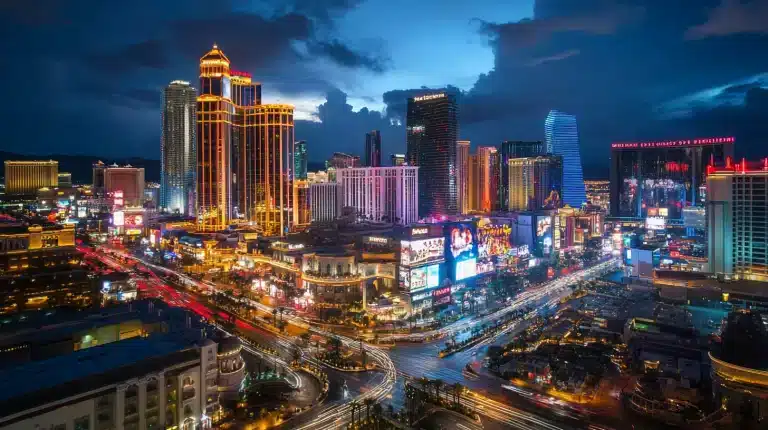Undoubtedly, iGaming powerhouses are giving land-based venues a run for their money, thanks to their convenience and vast game variety.
However, it doesn’t mean that players have forgotten about the sheer thrill of actually playing in a physical brick-and-mortar gambling lobby since, in such settings, they can enjoy interaction with fellow players in person.
Thus, land-based casino venues continue to be popular in Poland, the United States, the Macau Peninsula, and many other parts of the globe.
Well, beyond their entertainment factor, physical establishments, especially when they are set up in clusters, can serve as a strong driver of the economy in the regions where they are based.
These venues fuel the economies of local governments by creating plenty of income-generating opportunities. Here’s a deeper dive into how casino clusters bring economic benefits and boost regional competition.
The Gist of Casinos and Economic Development
Regional competitiveness and gambling clusters are directly related, and Atlantic City offers an excellent example of how casinos can impact a specific area. This region embarked on casino development to boost tax revenue and to bring back to life the city, and it worked like a charm. Currently, the location has turned into a glowing seaside resort city after suffering through a fair share of hard times in the 1970s.
Before the pro-gambling reforms, widespread air travel made Florida’s resort destinations more accessible to wealthier tourists.
Additionally, local beachgoers began choosing other family-friendly spots along the Jersey Shore. However, when gambling was legalized on the East Coast, Atlantic City’s commercial casinos became vital to the city’s urban redevelopment.
During the 80s and 90s, casino clusters in the region were credited with being an essential element in the revival of the Southern New Jersey economy.
While the city didn’t achieve its broader development goals, the region at large benefited from increased jobs and economic activity.
How Casinos Enable Regional Competitiveness
Besides Atlantic City, Las Vegas, and Macau, some of the other cities with the most prominent gambling clusters in the world include the following:
- San José, Costa Rica;
- Lima, Peru;
- Cairo, Egypt;
- Amsterdam, Netherlands;
- Manila, Philippines;
- San Juan, Puerto Rico;
- Marina Bay, Singapore.
So, let’s find out how the casino clusters in these regions bring economic benefits and contribute to regional competitiveness!
Tax Revenue and Public Services
One of the key impacts of casino clusters on local economies is enhanced tax revenue. Governments often set higher tax rates on casino earnings than other industries because of the industry’s profitability and the need to balance out any possible social costs.
For example, U.S. gambling establishments can contribute $52.7 billion in taxes, as shown by economic reports. These funds support critical public services like infrastructure, education, and healthcare.
Additionally, states such as New Jersey direct a portion of the tax revenue from casinos toward specific causes like urban development projects and senior citizen services. These funds have greatly improved the quality of life for residents and tackled ongoing social and economic issues.
Employment Opportunities and Workforce Development
Casinos play a crucial role in driving local economies as the job opportunities they create go far beyond just the gambling sectors. Land-based venues not only provide players with casino games but also create plenty of jobs in industries like culinary, event planning, hotel management, and security.
It differs a lot from the state of affairs in the iGaming sector powered by online casino websites like the bruce casino platform.
Gambling resorts also boost local economies directly through workforce development. They offer vital training programs to only meet their own staffing needs and build a skilled labor force in the area.
The economic impact of casinos reaches the broader community as well. Employees with steady jobs and good pay spend their earnings on local goods and services, from housing and food.
Tourism and Ancillary Spending
Millions of people visit casinos for gambling and the huge variety of entertainment options. These establishments have become a crucial part of the tourism industry in many towns.
In 2023, Las Vegas attracted about 40.8 million visitors, 5.2% more than the previous year. This number marked the highest number of visitors since 2019 when the city hosted 42.5 million.
The influence of casino-related tourism spreads beyond the casinos themselves. Tourists often explore cultural exhibits, spend money at local businesses, and enjoy nearby entertainment venues. It is easy to assume that even the transport industry itself benefits from the tourists who flock to the city.
Infrastructure Improvements
Gaming revenue from casinos helps fund essential infrastructure improvements. This financial boost allows local governments to start large-scale projects without raising taxes for residents. In turn, upgrading infrastructure in the regions also brings long-lasting economic benefits that encourage future growth.
Part of the casino revenue has enabled crucial infrastructure upgrades in areas like Atlantic City. For instance, public transportation improvements have made it easier for residents and tourists to get around the city.
A More Competitive Future Awaits Thanks to Casinos
There you have it! The casino industry has certainly had an undeniable impact on the economic growth of different regions worldwide, provided there is proper regulation.
From the look of things, the industry is expected to evolve even more, deliver more exciting experiences for players, and inject more economic lifeblood into the economies it supports.









